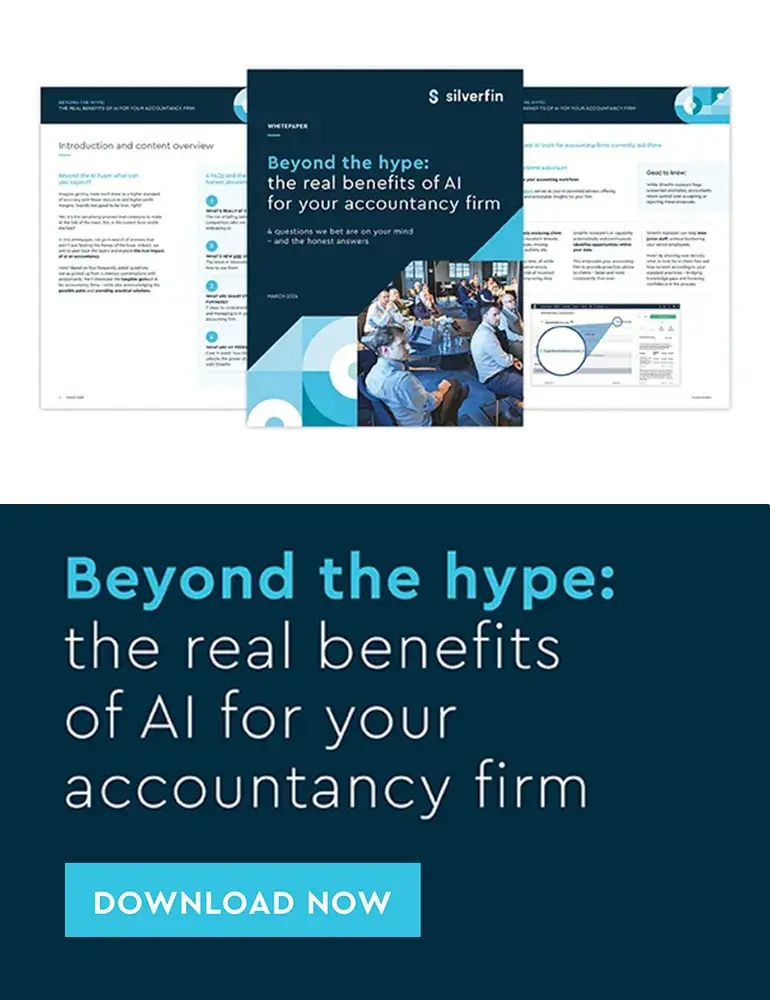Accounting firms face the dual challenge of managing burgeoning data while maintaining precision and compliance. As regulatory landscapes become more complex and client demands for real-time insights increase, traditional methods strain under the pressure of modern expectations.
The risk? Firms that fail to innovate may see their efficiency dwindle, client satisfaction wane, and ultimately, find themselves outpaced by more agile competitors.
Herein lies the crucial role of Artificial Intelligence (AI).
AI in accountancy is a tool that supports and enhances human expertise. From automating mundane tasks to analysing vast datasets for insightful forecasting, AI doesn’t just keep your firm afloat in the digital age—it helps it thrive.
Below, we delve into how AI and accountancy go hand in hand and why AI is an essential tool for modern firms that want to drive accuracy, efficiency and strategic foresight.
AI and Accountancy: How It Can Give Your Firm The Ultimate Competitive Advantage
Let’s explore how accounting artificial intelligence can give your firm a competitive advantage, streamline operations and enhance decision-making capabilities.
AI Enhances Data Management and Productivity
Effective data management in accountancy is more than handling vast amounts of information – it’s about extracting accuracy and value from every byte.
By mitigating human error, AI technologies hold the potential to enhance the precision of financial reporting, using intricate algorithms to scrutinise extensive datasets and uncover anomalies that may be difficult to spot by the human eye.
An AI accounting tool like Silverfin Assistant can improve your error detection process, reduce the time spent on manual data entry and increase data processing speeds, boosting productivity by up to 40%.
Russell Frayne, Director of Transformation at Gravita, highlights the practical benefits: “Instead of reviewing the data manually, we ran it through Silverfin Assistant. The tool ran around 100 checks and spotted three or four opportunities that were ‘nice to know’ but also four errors that were spot-on. It would have taken an accountant, say, 30 minutes or more to dive into the file and find those anomalies.”
With AI continuously analysing client files for anomalies, accountants can focus on higher-value activities like advisory services and quickly solve issues the AI tool finds, such as unusual balances or missing transactions, before they become a bigger problem.
Ultimately, AI in accounting transforms data management practices, enhancing efficiency, reducing errors, and delivering a higher quality of service to clients.
AI Boosts Compliance and Reporting
In our white paper, “Beyond The Hype: The Real Benefits of AI for Your Accounting Firm, we discuss how AI can automate and refine your compliance processes, ensuring your accounting practices remain up-to-date with ever-changing financial regulations.
“There’s a fear among many accountancy firms of AI messing up client data governance and compliance,” explains Cameron Ford, UK GM at Silverfin. “But with proper protocols and oversight, these concerns can be mitigated while even making your compliance work easier and better.”
AI-driven platforms can fast-track your compliance workflows and help produce precise financial management accounts. The technology reduces the risk of human error and ensures higher consistency in compliance practices, which are crucial for audits and regulatory reviews.
“Using Silverfin Assistant for VAT compliance and the management account reports has delivered significant time savings, and the savings just keep coming,” highlights Rosie Cooper, Director at PM+M.
AI and Predictive Analytics
Most accountants want to interact more with their clients and move away from number crunching towards a more advisory role. However, it’s a struggle to achieve this because of time constraints and insufficient access to timely and quality data.
AI and its predictive analytics capabilities are the solution.
Leveraging historical data, your firm can provide personalised advice based on data-driven predictions. AI uses algorithms to discern patterns and insights from data sets to proactively identify opportunities, detect fraud indicators, predict market trends and forecast financial outcomes.
It gives your firm a strategic advantage your competitors can’t replicate and empowers your team to provide proactive advice to clients faster and more consistently than ever.
Russell Frayne, Director of Transformation at Gravita, succinctly captures the essence of AI in accounting: ‘AI is meant to streamline processes, not replace people. By automating time-consuming tasks, AI frees up our time, allowing us to engage more deeply with our clients and focus more on advisory roles, which truly adds value.‘
AI and Cost-Effectiveness
One of the standout statistics from our whitepaper is that current technologies can reduce costs by automating up to 50% of routine accounting tasks.
With fewer hours needed for data entry, reconciliation, and compliance checks, it directly translates into cost savings for firms and frees up time for new revenue streams like advisory services.
Moreover, AI’s scalability plays a critical role in its cost-effectiveness. Unlike traditional software solutions, AI systems can quickly scale to handle increased loads or complex computations without significant additional investments.
Thus, AI not only fits into the current financial structure of a firm but also supports its growth trajectory, making it an invaluable asset for modern accounting firms.
Harnessing Accounting Artificial Intelligence for Future Success
AI and accountancy are a match geared towards the future. As we’ve explored, AI enhances data management, improves compliance and reporting, offers predictive insights and ensures cost-effectiveness. These benefits are integral to building a sustainable business in the competitive field of accountancy.
To see how AI can benefit your firm, request a Silverfin demo today. See firsthand how our built-in tools, like Silverfin Assistant, can transform your business operations and drive your firm towards greater profitability and success.

Frequently Asked Questions
How does AI specifically improve client relationships in accounting?
AI enhances client relationships by enabling more personalised and efficient communication. For example, AI-powered chatbots can provide clients with instant responses to queries, and predictive analytics can offer tailored financial advice based on unique client data, making interactions more relevant and valuable.
Can AI handle complex accounting tasks like tax preparation and audit?
Yes, AI is increasingly capable of handling complex tasks such as tax preparation and audits. AI systems can analyse large datasets to identify discrepancies, calculate taxes based on the latest regulations, and even predict audit risks. This helps firms ensure accuracy and compliance while streamlining these intricate processes.
How do accounting firms ensure the accuracy of AI predictions and analyses?
To ensure the accuracy of AI predictions and analyses, firms should use high-quality, clean data and continuously train and test their AI models against new data and scenarios. Additionally, combining AI insights with human oversight and expertise is crucial for validating AI-generated recommendations and ensuring they are practical and reliable.
How does AI impact the role of accountants in the long term? In the long term, AI is expected to shift the role of accountants from traditional number-crunching to more strategic advisory roles. As AI takes over routine tasks, accountants will focus more on interpreting data, making strategic decisions, and providing personalised financial consultation, which adds greater value to their roles and enhances career development opportunities.














